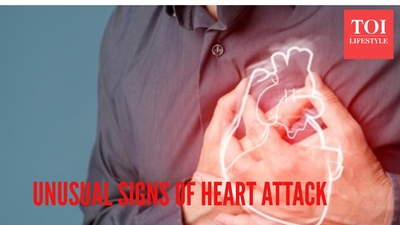
When we talk about heart attacks, we usually picture a scene straight out of a movie scene – a man clutching his chest in pain, and then collapsing to the ground, unconscious. However, heart attacks, no matter how major, do not always look like this. In a video, Dr. Jeremy London, Cardiovascular Surgeon, points out that subtle signals can be just as critical, however, they are frequently missed. Spotting these cues can be life‑saving, because ignoring them can be hazardous. Let’s learn more….Shortness of breathDr. Jeremy often emphasises that breathlessness is a warning si…

When we talk about heart attacks, we usually picture a scene straight out of a movie scene – a man clutching his chest in pain, and then collapsing to the ground, unconscious. However, heart attacks, no matter how major, do not always look like this. In a video, Dr. Jeremy London, Cardiovascular Surgeon, points out that subtle signals can be just as critical, however, they are frequently missed. Spotting these cues can be life‑saving, because ignoring them can be hazardous. Let’s learn more….Shortness of breathDr. Jeremy often emphasises that breathlessness is a warning sign of a heart attack. It may also appear when there is no chest pain, leaving you with the feeling that you simply can’t draw enough air, whether you’re engaged in light activity, or just resting. The root cause is typically a heart that’s struggling to pump blood, which results in fluid accumulating in the lungs. Because the symptom can be subtle, many people mistake it for asthma or anxiety. Yet, if you suddenly become breathless in a way that’s not normal for you, alongside other signs, you should seek medical help immediately. Dr London reiterates that in most cases, there will be no chest pain, which makes it imperative to pay attention to other signs.
WeaknessDr. Jeremy emphasises that a sudden spell of dizziness, a light‑headed sensation, or odd weakness may actually be the body’s way of saying that your heart isn’t receiving oxygen. This oxygen shortfall usually arises when blood flow is obstructed, or slowed by problems. The danger lies in how these cues are brushed aside as simple fatigue, or dehydration. Yet realising that an unexplained bout of weakness or faintness, might signal a heart attack can spur action.
Pressure, in the jaw, neck or backAccording to Dr London, a heart attack without chest pain, can in fact, cause pain in other areas-the jaw, neck or the upper back. Dr. Jeremy points out that a feeling of pressure, tightness, squeezing or heaviness in those areas can be a tell‑tale sign of trouble. This discomfort often pops up intermittently, and feels unlike a muscle ache. Because such cues are atypical, many people fail to link them to the heart, which can postpone treatment.FatigueAccording to Dr. Jeremy, some individuals feel no pain at all, before a heart attack. They may however, notice vague cues-nausea, crushing fatigue or a general sense of malaise. Those subtle hints show up among women and older adults more often. Persistent tiredness, weakness or a lingering feeling of illness, without a cause, should never be shrugged off. Because these quiet warning signs are so easy to dismiss or are attributed to something else, they can let a heart attack slip further unchecked.Why these odd symptoms can actually be dangerousDr. Jeremy explains that these atypical subtle signs can be more hazardous than the chest‑pain symptoms. Because they’re easy to miss, people often delay seeking care, which raises the risk of heart injury, or even death. Recognising these cues improves detection, and boost survival rates. Prompt treatment can prevent complications, and lead to better outcomes.Listen to what your body is sayingDr. Jeremy’s core advice is simple-listen to your body’s warnings. If you suddenly notice shortness of breath, odd weakness, or a pressure sensation, in your jaw, neck or nausea, especially when you have risk factors such as blood pressure, diabetes or a smoking habit, don’t sit around waiting. Call emergency services, and see a doctor away.Women and older adultsDr. Jeremy notes that women and older adults, often don’t exhibit typical heart attack symptoms. This group tends to report fatigue, nausea or vague discomfort in areas beyond the chest. Recognising these signs is essential for treatment, and improving survival rates in these populations.It is important to stay updatedDr Jeremy also advises everyone to keep themselves tested regularly, even if they are not heart patients, diabetic, Hypertensive, and without any history of heart disease. Even perfectly healthy individuals can get heart attacks, so it is important to not miss your screenings, and keep your vitals, and blood sugar in control, always.
